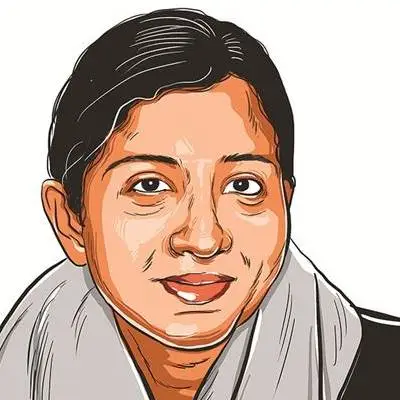IN A TELLING early episode of The Crown, the multiple Emmy-winning Netflix series on the life and times of Queen Elizabeth II, Winston Churchill’s character is seen chiding Princess Margaret for letting her personality seep into her representation of the sovereign in her absence. “No one wants you to be you, they want you to be it…The Crown, that’s what they have come to see… The minute you become yourself, you shatter the illusion, break the spell.” The sibling rivalry between that heir and spare does not end there, but there are no prizes for guessing who is up for a win.
His relationship with his great-aunt Margo had been distant, rues Prince Harry, now fifth in line to the British throne, in his runaway bestseller of a memoir, but he recognises in her a kindred spirit, plagued by that particular affliction of spares in the British royal line — the desire to become themselves by going beyond their ordained supporting acts.
Indeed, he seems to harbour the same resentment at having to toe the institutional line and play second fiddle to his elder brother and heir, Prince William, that Princess Margaret did for Queen Elizabeth II. It becomes the leitmotif of his tell-all memoir, with its insights into the lives of insecure royals and treacherous aides; the sobering account of his anguish and bewilderment at the unexpected and shattering loss of a beloved parent when he was only 12, and “the red mist” of anger that engulfs Harry as he gets sucked into an endless vortex of paparazzi hounding, that killed his mother and threatens to trap him and all who he holds precious.
Preceded by juicy, incendiary leaks, just the sort he bemoans in the pages of the book, Spare is a riveting read, mainly, one suspects, because of the intervention of its ghostwriter, the Pulitzer Prize-winning journalist JR Moehringer, also the man behind tennis superstar Andre Agassi’s memoir, Open. Here, Moehringer channels the royal’s discontent to just the right measure of candour, righteousness, and, puckish humour, to lead up to Harry and Meghan’s decision to step back from their roles as senior royals and initiate Megxit, caught as they were, Harry emphasises time and again, in the crossfire of targeted campaigns because of his underdog status.
Yet, even for the most sympathetic of readers, it’s hard to miss Harry’s blindness to his own privileges and failings, his insecurity (and envy?) that drives his constant disparagement of his brother (William is always portrayed as overbearing, emotionally distant and competitive, “his familiar scowl, which had always been his default in dealings with me; his alarming baldness, more advanced than my own; his famous resemblance to Mummy, which was fading with time”), and that makes no allowances for the heir’s share of their troubled inheritance.
It is a wisdom seldom acknowledged that if your cup of privilege runneth over, it’s best to do a reality check on your burden of woes, even if some, or a lot — depending on the lens you have on — of it may be legitimate. In repeatedly labouring over the raw deal that his place in his family has dealt him, Prince Harry seems to have overplayed his hand. In the end, it appears to be a self-exiled prince’s unreconstructed and unrequited need to be cajoled into a sense of belonging.
Saeed Mirza’s I Know The Psychology of Rats is a touching eulogy to his late friend, filmmaker Kundan Shah, director of the cult classic Jaane Bhi Do Yaaro


 Paromita Chakrabarti… read more
Paromita Chakrabarti… read more